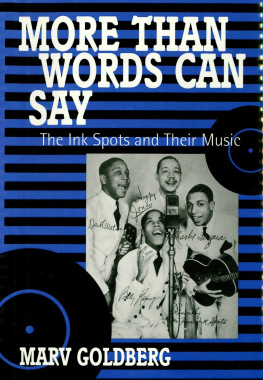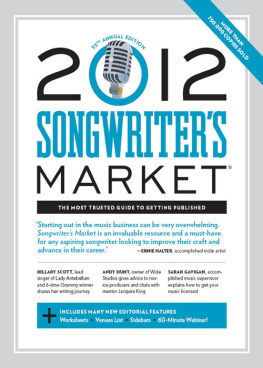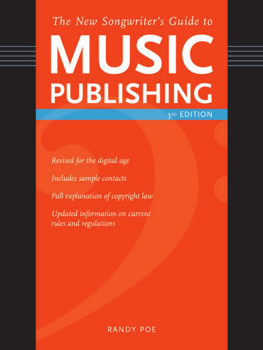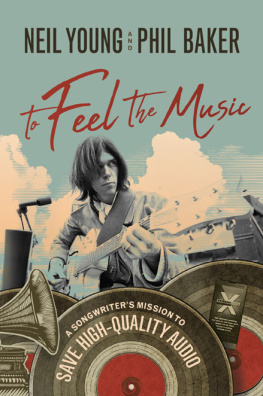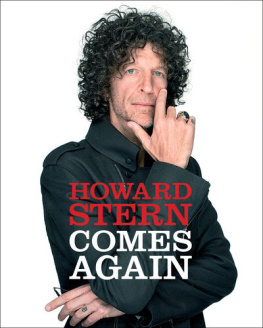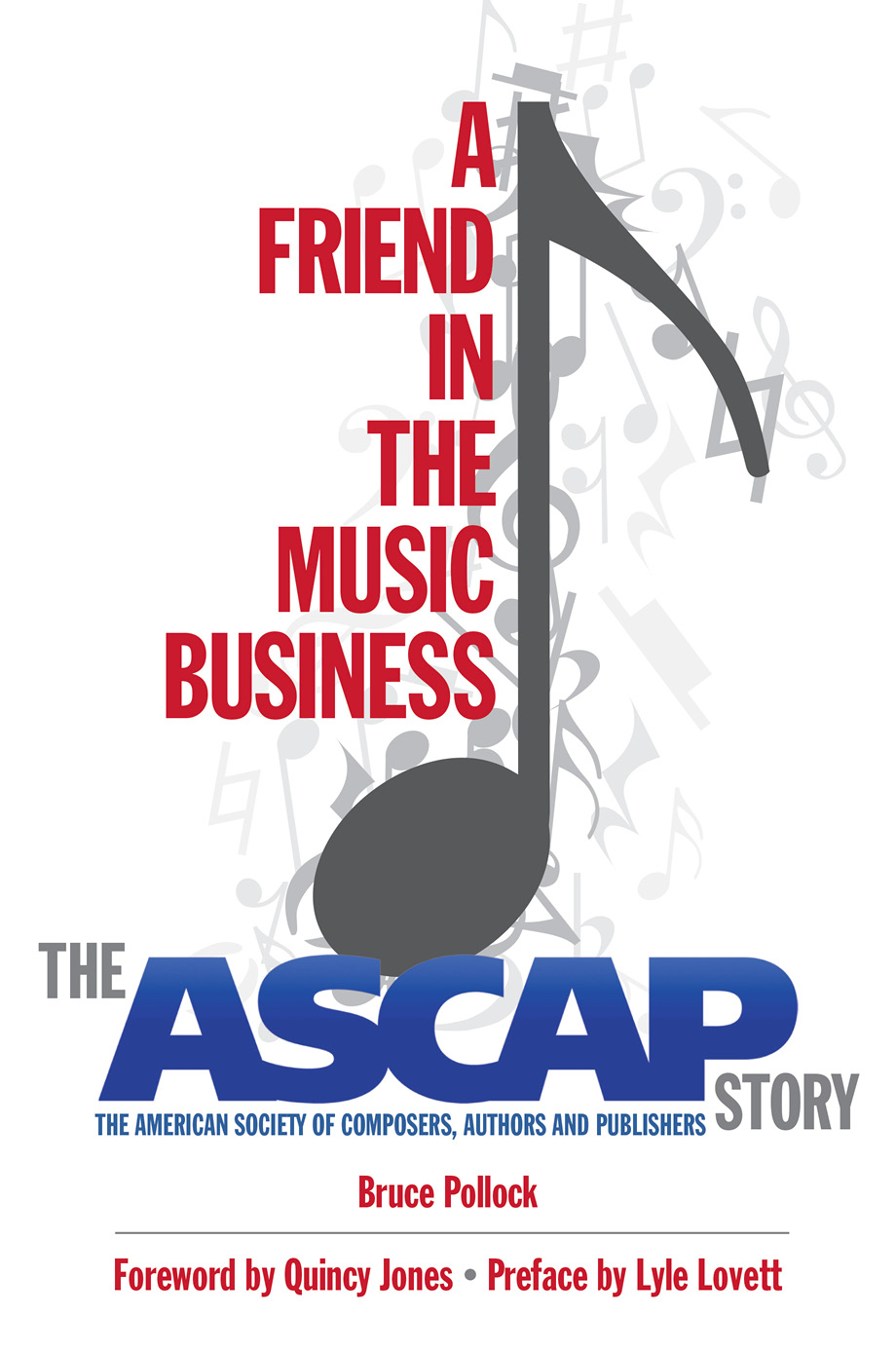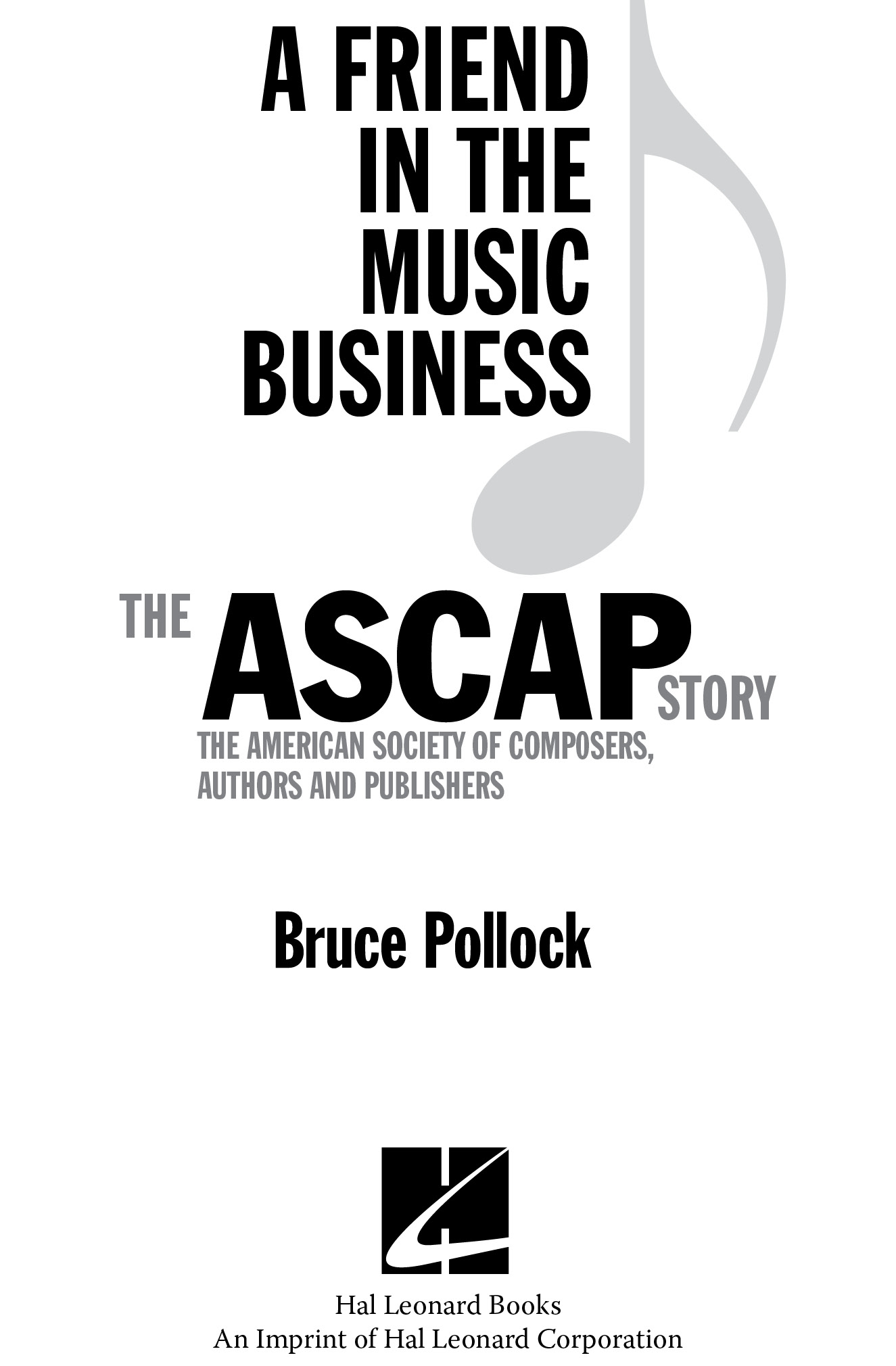Copyright 2014 by Bruce Pollock
All rights reserved. No part of this book may be reproduced in any form, without written permission, except by a newspaper or magazine reviewer who wishes to quote brief passages in connection with a review.
Published in 2014 by Hal Leonard Books
An Imprint of Hal Leonard Corporation
7777 West Bluemound Road
Milwaukee, WI 53213
Trade Book Division Editorial Offices
33 Plymouth St., Montclair, NJ 07042
While every reasonable effort has been made to contact copyright holders and secure permission for all materials reproduced in this work, we offer apologies for any instances in which this was not possible and for any inadvertent omissions. Any omissions brought to our attention will be remedied in future editions.
Printed in the United States of America
Book design by Publishers Design and Production Services, Inc.
Library of Congress Cataloging-in-Publication Data
Pollock, Bruce.
A friend in the music business : the ASCAP story / Bruce Pollock.
pages cm
Includes bibliographical references and index.
ISBN 978-1-4234-9221-4
1. American Society of Composers, Authors and Publishers. 2. Music tradeUnited States. I. Title.
ML3790.P66 2014
338.7'61780973dc23
2013042806
www.halleonardbooks.com
Contents
Why ASCAP Matters
I first joined ASCAP in 1955. I had previously spent a lot of time in France, and I knew about SACEM (Socit des Auteurs, Compositeurs et diteurs de Musique), the French equivalent of ASCAP. I heard the United States had their own version of it, so thats why I became a member. Also, many other composers and songwriters that I was familiar with were members too, like Duke Ellington and Count Basie.
For nearly 60 years, Ive worked as a producer, arranger, songwriter, and composer in almost every musical styleincluding pop, jazz, R&B, rock n roll, and classicaland in all media forms, including records, film, and TV. Its been an amazing journey. And through it all, ASCAP has always been there for me, making sure I received fair compensation for my work, thereby ensuring I could continue to work and grow as a creative artist. This has always been their main roleto be the champion for all their member songwriters and composers.
But in todays music business, there is a proliferation of piracy everywhere in the world. Songwriters and music industry professionals are challenged to stave off this epidemic, because the means for producing, replicating, and disseminating intellectual property such as music is so quick, easy, and accessible to everyone. In this climate, the challenge is, how do songwriters and composers continue to be properly compensated for their work? The solutions are not easy to find, but if we dont discover them, there arent going to be songwriters to write the great songs of the future. Thats why ASCAP is absolutely as essential now as it ever was and maybe even more so. Its a game-changing time throughout the business, with people reluctant to pay for various uses of music. Thats why its important for ASCAP to persevereto make every effort to work with the entire music industry, as well as legislative bodies, in making sure songwriters continue to be treated fairly in terms of appropriate compensation. So far, for the first 100 years of their existence, theyve done a great job; theyve consistently worked very hard to represent us at every turn, whenever theres been a challenge to our right to make a living from our creative work. ASCAP has their hands full, but they keep working at it and finding solutions. As songwriters, we certainly need them. They are essential to our existence.
I talk to young songwriters all the time. I tell them dont forget Gods rules, and thats to have humility with your creativity and grace with your success. Start with that. Thats very important. Then I tell them join ASCAP and youll get protected from piracy, because ASCAP is a rights protection organization. I tell them ASCAP will champion your right to earn a living on your creative work, and whats more, will collect revenue on your behalf for that work.
Right now, as a society, we are not respecting the rights of songwritersthat they need to be compensated for their intellectual property, which is their songs and compositions. The world is running outside the boundaries of the concept of intellectual property rights, and weve got to get back in them, because its about respect for peoples property and the morality of not just stealing it because it is so easy to do. But even though the business is in trouble, young songwriters are creating great music. Music and water will be the last things to disappear from this planet. People cant live without music. So well need ASCAP to be doing their job until the very end.
I was so honored when I received the ASCAP Founders Award in 2013. Some incredible musicians have been recipients of this prestigious honor. ASCAP has an amazing legacy and a long heritage of nurturing and supporting the creative process. Thats why I try to do as many ASCAP events as my schedule permits. We all need to do our part to keep ASCAP visible and in the publics eye, so everyone knows how important it is that they are there.
I was elected to be on the board of ASCAP, but at the time I was in the middle of an incredibly heavy workload, especially working with Michael Jackson and all my other endeavors in the 80s. So I wrote a long letter to ASCAP recommending that Marilyn Bergman take my place on the boardwhich she did, and not surprisingly, she later became an awesome president and chairman of ASCAP for a period of fifteen years, until 2009. (Currently, Paul Williams has taken the reins and is continuing to do a wonderful job.) Ive known Marilyn and Alan Bergman since we were next-door neighbors and worked together on the songs for In the Heat of the Night in 1967. Shes like family. I knew shed be right for the board because I knew her soul, her mind, and her God-given gifts. She definitely has a leaders mind. Shes brilliant. You can hear it in her lyrics.
If you want to know what ASCAPs mission is and always has been, just read the first few lines of How Do You Keep the Music Playing? with music by Michel Legrand and lyrics by Marilyn and Alan Bergman:
How do you keep the music playing?
How do you make it last?
How do you keep the song from fading too fast?
Quincy Jones
November 2013
Because of my admiration for great ASCAP songwriters, I decided to join the Society in 1984. ASCAP members and fellow Texans Guy Clark, Townes Van Zandt, Steven Fromholz, Willis Alan Ramsey, and Rodney Crowell were all songwriters I listened to and admired greatly. And there were non-Texans I admired who formed a circle of songwriting royalty at ASCAP: George Gershwin, Burt Bacharach and Hal David, Billy Joel, and Stevie Wonder. What an amazing pedigree ASCAP boasted, and what a tremendous job this organization did in safeguarding the rights of songwriters and music publishers, making it possible for its songwriters to make a living writing music. That was my impression when I joined ASCAP, and in the years that have followed, that impression has been reinforced many times over.
I consider myself fortunate to have had the opportunity to interact with ASCAP and its people on many levels. The ASCAP office in Nashville was a point of entry for me and for so many others. It was a place we aspiring songwriters could go when we needed encouragement, inspiration, and even a few dollars to keep going. I, and many songwriters like me, were allowed space there to practice and were given advice that went a long way in making progress in our careers. ASCAPs doors were always open.


